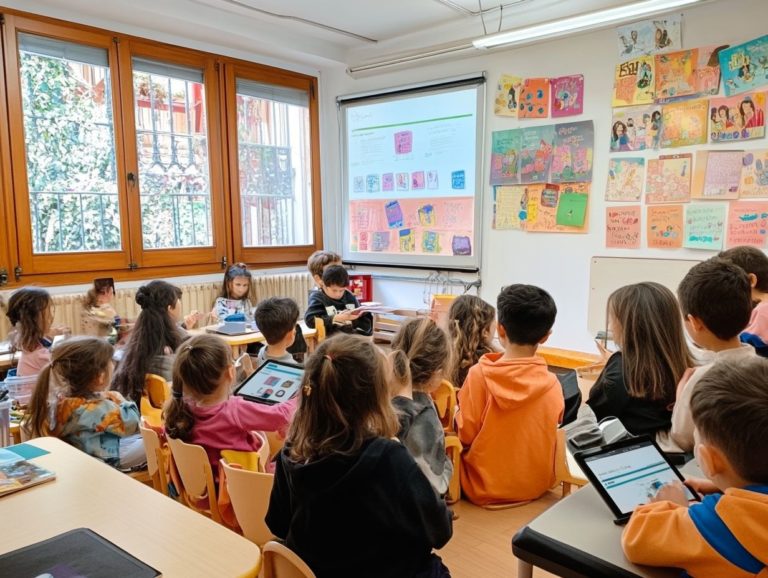5 essential tips for choosing language courses
Choosing the right language course can greatly affect your learning journey and overall success. With a plethora of options at your fingertips, it s crucial for you to identify your goals and preferred learning style before taking the plunge!
This article will present five essential tips to help you select a course that truly aligns with your needs. You will also discover common mistakes to avoid and understand how a well-chosen language course can elevate your career prospects and enrich your cultural awareness. Dive into this guide and make the best choice for your language journey!
Contents
- Key Takeaways:
- 1. Determine Your Goals and Needs
- 2. Consider Your Learning Style
- 3. Research the Course Content and Curriculum
- 4. Check the Qualifications of the Instructors
- 5. Read Reviews and Get Recommendations
- What Are the Different Types of Language Courses Available?
- What Are the Benefits of Taking a Language Course?
- What Are the Common Mistakes to Avoid When Choosing a Language Course?
- How Can a Language Course Help with Career Advancement?
- What Are the Factors to Consider When Choosing Between In-Person and Online Language Courses?
- How Can a Language Course Help with Cultural Understanding?
- Frequently Asked Questions
- What are the 5 essential tips for choosing language courses?
- Why is it important to assess my learning goals before choosing a language course?
- How can I stick to my budget when choosing a language course?
- What should I look for when researching the course content?
- Why is it important to check the teacher’s qualifications?
- How can I find reliable reviews from past students?
Key Takeaways:

1. Determine Your Goals and Needs
Determining your goals and needs is the essential first step in selecting a language course that truly resonates with you. If you’re looking to enhance your English proficiency, incorporating 5 language immersion tips for beginners through a structured and goal-oriented approach is key!
Your goals might range from academic achievements like preparing for university entrance exams to social aspirations, such as building connections in diverse settings.
If you re eyeing professional growth, your ambition may push you to seek language training that will help you excel in global workplaces and enhance your career prospects.
By thoughtfully assessing your individual needs and personal requirements, you can select courses that are precisely tailored to you, creating an enabling learning environment.
The importance of flexible options is paramount; they allow you to adapt your learning path and accommodate differing schedules, ensuring a more personalized and effective educational experience.
2. Consider Your Learning Style
Understanding your learning style is essential when selecting an effective language course. It directly impacts how you engage with the material and absorb new information, especially when using language learning tips through cultural immersion.
By identifying whether you are a visual learner who thrives on images and diagrams, an auditory learner who benefits from listening, or a kinesthetic learner who prefers hands-on activities, you can customize your educational journey.
When you choose a course that aligns with your primary learning style, you ll notice a significant boost in immersion. This tailored approach boosts your understanding and keeps you engaged.
It also enables quick feedback from teachers, which is crucial for reinforcing your learning and building confidence in your language proficiency.
3. Research the Course Content and Curriculum
Researching the course content and curriculum is crucial for ensuring that it meets your specific learning needs and aligns with your language goals. Whether you’re diving into a foundational program or pursuing advanced certifications, this step is vital!
Evaluating the course structure gives you valuable insight into how effectively it balances theoretical knowledge with practical applications. This balance can significantly elevate your learning experience.
It’s essential to examine the types of resources used, such as textbooks, online materials, and interactive tools that contribute to a well-rounded understanding.
A strong emphasis on real-life situations where you practice the language can greatly enhance language acquisition.
By assessing how the curriculum aligns with your personal objectives and its real-world applicability, you can determine its effectiveness in fostering relevant skills that you can utilize beyond the classroom.
4. Check the Qualifications of the Instructors

Checking the qualifications of instructors is paramount, as their expertise can greatly affect how you learn and the effectiveness of the teaching methods used in the language course. For more insights, consider navigating online language courses with helpful tips and tricks.
When you’re considering a language course, it’s vital to carefully check the instructor’s educational background, teaching experience, and proficiency in the language. Additionally, exploring 5 proven strategies to boost language learning can enhance your overall experience.
Native speakers bring invaluable insights that extend beyond simple vocabulary and grammar. They offer cultural nuances and societal contexts that enhance your understanding of the language.
Learning from someone steeped in the culture can foster authentic interactions, enriching your educational journey. Instructors with practical teaching experience are generally adept at breaking down complex concepts into accessible ideas, creating a more engaging and effective learning environment.
5. Read Reviews and Get Recommendations
Reading reviews and gathering recommendations are invaluable steps in your decision-making process when selecting a language course. They provide insights into the experiences of other students and the overall effectiveness of the program, helping you learn how to successfully complete a language course.
To find credible reviews, you can explore university resources that often publish evaluations and comparisons of different language courses. Additionally, looking into engaging language courses for high school students and tapping into community feedback through forums, social media groups, and local meetups can also offer informal yet valuable perspectives.
These reviews shape your expectations and help you assess teaching quality and course materials. By diving into these assessments, you can make informed decisions that align with your personal goals, ultimately enhancing your overall learning experience.
What Are the Different Types of Language Courses Available?
You have access to a diverse range of language courses, each tailored to meet your unique learning needs, goals, and preferences. Whether you opt for immersive experiences in community settings or flexible online options, there s something for everyone.
For example, immersive programs offer you a rich cultural experience, allowing you to practice the language in real-world scenarios. This approach can significantly enhance your retention and understanding.
Online courses offer unmatched flexibility, enabling you to learn at your own pace while seamlessly fitting into your busy schedule.
In-person classes foster meaningful interaction with peers and instructors, creating a dynamic learning environment that encourages conversation. Each course type has its own advantages, whether through personal engagement, adaptable learning timelines, or cultural immersion.
This allows you to choose the path that best aligns with your personal and professional goals.
What Are the Benefits of Taking a Language Course?
Taking a language course opens the door to many exciting benefits, from enhancing your proficiency and communication skills to enriching your cultural understanding and personal growth through structured learning.
These courses sharpen your cognitive skills, which are your brain s abilities to process information, solve problems, and multitask. They also significantly expand your job prospects.
In today s global job market, employers seek candidates who can thrive in multicultural environments, making the ability to speak another language an invaluable asset.
Language courses provide essential resources and support, featuring experienced instructors and interactive tools that make learning effective and engaging. This blend of academic rigor and cultural exposure deepens your appreciation for diversity, enabling you to forge meaningful connections with individuals across the globe.
What Are the Common Mistakes to Avoid When Choosing a Language Course?

When selecting a language course, it’s essential to be aware of common mistakes that could hinder your learning journey. For instance, how to choose the right language course online involves avoiding pitfalls like overlooking course evaluations, ignoring your personal learning style, or failing to consider the total costs involved, all of which can set you back.
One significant pitfall is neglecting to research the qualifications of the instructor. Look for instructors with teaching experience and strong credentials, as this can greatly impact the quality of your education. It s also easy to overlook the invaluable insights that community reviews can provide. Tapping into the experiences of past students can reveal hidden strengths or weaknesses of a program that you might otherwise miss.
Understanding how the course aligns with your personal goals whether for travel, work, or understanding and valuing different cultures ensures that your learning experience remains relevant and motivating.
By thoroughly investigating these factors, you can make a more informed choice that truly supports effective language acquisition.
How Can a Language Course Help with Career Advancement?
A language course can supercharge your career prospects by providing you with essential skills, certifications, and cultural insights that are increasingly valuable in the global job market.
Employers actively seek candidates who can communicate effectively in diverse environments, making language proficiency a vital asset. Recognized certifications not only validate your language abilities but also showcase your commitment to professional growth.
Mastering languages like Spanish, Mandarin, or French can open doors to opportunities in international business, diplomacy, and tourism.
Language courses often hone skills in negotiation, presentation, and cross-cultural communication, all of which are crucial for advancing your career.
By embracing these educational opportunities, you position yourself as a competitive candidate, fully prepared to tackle the complexities of your chosen field.
What Are the Factors to Consider When Choosing Between In-Person and Online Language Courses?
When weighing the options between in-person and online language courses, several factors come into play. Consider your personal learning preferences, the flexibility you desire, how much interaction you crave, and the role that community engagement plays in your educational journey.
Each format brings its own set of advantages and challenges tailored to various needs and lifestyles. In-person courses often create an immersive atmosphere where you can engage directly with instructors and peers, enhancing your motivation and fostering meaningful connections.
Conversely, online courses offer unparalleled flexibility, allowing you to study at your own pace and seamlessly integrate lessons into your busy schedule. However, the absence of face-to-face interaction in online settings might leave you feeling a bit isolated, while in-person classes can sometimes be limited by location and time commitments.
This creates a unique dilemma as you navigate your learning options.
How Can a Language Course Help with Cultural Understanding?
A language course serves as a remarkable tool for fostering cultural understanding. It often blends immersive experiences that allow you to engage with and appreciate diverse cultures and perspectives.
As you interact with local communities, you ll have the chance to practice your language skills in authentic settings, transforming your learning experience into something vibrant and dynamic.
Workshops led by native speakers provide valuable insights into traditions, customs, and social norms. This ensures that language acquisition extends beyond mere vocabulary to encompass the rich context in which words are used.
Real-world experiences, whether through volunteer opportunities or cultural exchange programs, enrich your educational journey and pave the way for personal growth.
By grasping the subtleties of cultural expressions, you deepen your proficiency and forge meaningful connections, ultimately enhancing both your linguistic abilities and intercultural competence.
Frequently Asked Questions

What are the 5 essential tips for choosing language courses?
Here are the 5 essential tips for choosing language courses:
1. Assess your learning goals.
2. Consider your budget.
3. Research the course content.
4. Check the teacher’s qualifications.
5. Read reviews from past students.
Why is it important to assess my learning goals before choosing a language course?
Assessing your learning goals is crucial. It helps you identify which language course suits your needs best and can guide you towards 5 quick tips for everyday language practice.
For instance, if you want to improve your speaking skills, opt for a course that emphasizes conversational practice over grammar.
How can I stick to my budget when choosing a language course?
To stick to your budget, consider online courses; they are often more affordable than in-person options.
Don t miss out on discounts! They can make learning a new language much more affordable. Also, inquire about payment plans available from language schools.
What should I look for when researching the course content?
When researching course content, look for a detailed outline of topics, teaching methods, and learning materials.
This information ensures the course aligns with your learning goals and preferences.
Why is it important to check the teacher’s qualifications?
Check the teacher’s qualifications and experience. This greatly affects the course’s quality and your learning journey.
A qualified teacher enriches the learning experience, so ensure they have relevant experience in teaching the language.
How can I find reliable reviews from past students?
Act quickly! Check the language school s website for reviews, explore their social media pages, or visit review platforms.
You can also reach out to friends or acquaintances who have taken the course and ask for their honest feedback.


